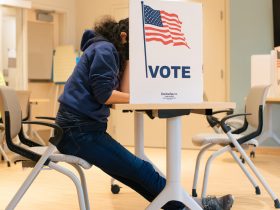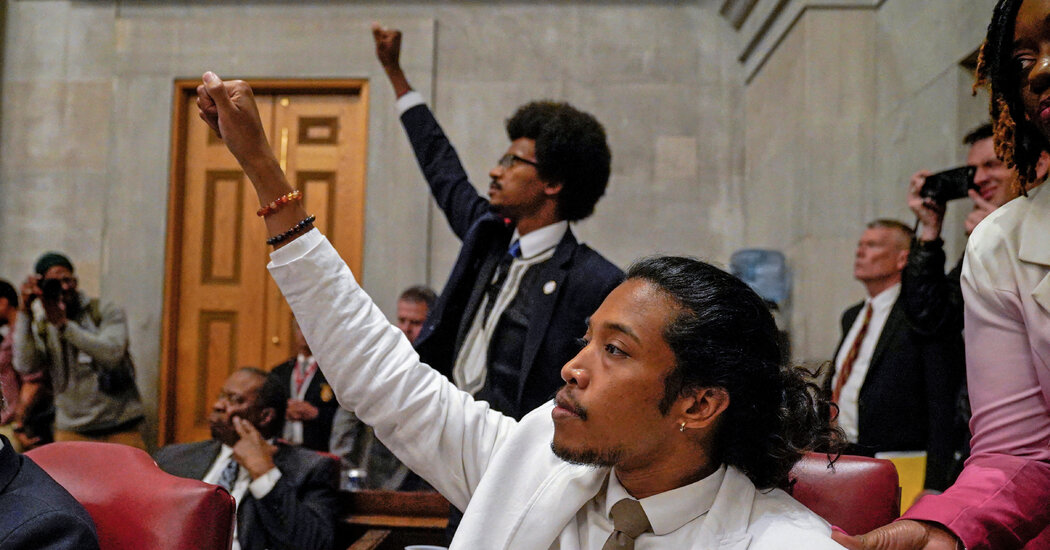While the world was watching the former president surrender to authorities in a New York City courthouse last week, I was watching Nashville and Raleigh. I live in North Carolina, and these two seats of government and capitals in bordering Southern states have been roiled with political unrest in the shadow of the Donald Trump Show.
We like to look to the horizon instead of to the soil because we bury the people we do not care about in the South. It is where we have put migrants and poor people and sick people. It is where we put the social problems we are willing to accept in exchange for the promise of individual opportunity in places that sound more sophisticated. But the South is still a laboratory for the political disenfranchisement that works just as well in Wisconsin as it does in Florida. Americans are never as far from the graves we dig for other people as we hope.
First, in Nashville on March 27, people mourned six dead from the nation’s 130th mass shooting this year. Three of the murdered were children, each 9 years old. The shooting took place at a private Christian academy, if such things are supposed to matter to one’s outrage. It shouldn’t. But I mention it because this is America.
Nashville is a politically centrist, demographically and economically diverse city that self-consciously manufactures conservative culture exports in a deeply conservative state. The town was coming off protests around a massively undemocratic ban on drag shows. The two events seem unconnected, but they are not. Because after the shooting two weeks ago, Tennesseans were primed for civic action. And civic action is what we saw when people lined up outside the G.O.P.-dominated House demanding sensible gun reforms. Three Democratic lawmakers — Gloria Johnson, Justin Jones and Justin Pearson — joined the protesters, many of them children not that much older than the victims in last month’s massacre.
Video from the Tennessee House floor shows actual people in the people’s house, directly engaging elected representatives who are usually inoculated from the voters who have to live with the outcomes of their political machinations. Politicians look more like brawlers than like erudite statesmen. The veil of ugliness between decorum and how our lawmaking actually works — permitting the killing of kids in classrooms — was pierced briefly.
The Republicans appeared more outraged by direct engagement with voters than they are by gun violence, judging by how quickly they moved to punish Johnson, Jones and Pearson. They expedited the resolution to expel the three Democrats and pushed for a resolution by the end of the week. By the end of the day on Thursday, the Tennessee House had expelled Pearson and Jones. (Nashville’s Metropolitan Council voted unanimously on Monday to reappoint Jones to House District 52.)
This swift political action is the kind that the 71 percent of Americans who want stricter gun laws can only dream of happening.
As I was watching Nashville, I got word that my own Southern state of North Carolina did not want to be left out of the political theater.
We have a majority Republican General Assembly and a Democratic governor, Roy Cooper. The joke goes that as the state’s thin purple line, Cooper is the only thing standing between us and anti-free-speech legislation, the draconian gutting of reproductive rights and expressions of white racial resentment that were battle tested in Wisconsin, were refined in Florida and are being propagated state by state.
The power of the governor’s veto had been reliable up until this week, when the North Carolina Democratic representative Tricia Cotham switched her party affiliation to Republican. Dressed in Republican red, she looked to all the world like a party faithful. A democratically elected representative in a district that went for Biden by 23 points in the last presidential election, Cotham gives Republicans a legislative supermajority in North Carolina with the switch.
Cotham has run on a platform that champions bodily autonomy, among other things. In response to questions posed at a news conference about the impetus for her party switch, Cotham refused to name a single policy that motivated her. Nor would she say if she would maintain her position on abortion.
Cotham’s silence may be prescient, but I would not bet on it. Sure, she could vote like a maverick Republican, but if she does, she would not be much of one. Downstate conservatives who break with the G.O.P. are just as likely to be censured (if differently) as Democrats who chant in the Tennessee House. The South is, above all, a political climate that rewards loyalty. It is hard to imagine turning a candidate only to allow her to be an independent. However Cotham votes, the once-purple North Carolina just got far more inhospitable for progressives, let alone Democrats.
Just last month, a visiting colleague asked me if it was safe to recommend schools in my state to her daughter, who was shopping for colleges. My colleague and her spouse are realistic parents who know that young people have sex and sometimes sex produces babies. They want their daughter to go to college in a state where she would have access to reproductive care that would not put her at risk of going to jail. Over drinks, I explained that North Carolina is not the friendliest state. Abortion is legal there, but access is spotty. Care is getting harder to access as a mishmash of laws in bordering states makes it hard for doctors to navigate the regulatory climate. North Carolina bans abortion after 20 weeks and six days of pregnancy and has yet other restrictions on abortion access. But, qualifying my concern, I explained that the state was not quite yet in the danger zone because our governor has veto power. That is how we talk about which rights we have in the state — one politician, usually a man, at a time.
I keep my eyes on the South for a lot of reasons. This is my home. It is the geography of this nation’s original sin. Nothing about the future of this country can be resolved unless it is first resolved here: not the climate crisis or the border or life expectancy or anything else of national importance, unless you solve it in the South and with the people of the South.
I also keep my eyes on the South because the Republican strategy of disenfranchisement is a state-by-state strategy. It looks like judicial rule where they cannot win. Where they cannot win by judicial rule, they will rule by procedural theft. Where they cannot persuade voters to vote for them, they will persuade the candidate they voted for to become one of them. This is a strategy that can be deployed in every state but that can be deployed with the most exacting precision in states where racism already conditions the exclusion of nonwhite voters as inherently illegitimate.
The South is not exceptionally racist. The South is quintessentially American in its racism. The distinction is clear in how, of the three representatives in question, Tennessee expelled the two Black men but the third, a white woman, held on to her seat. The strategies of disenfranchisement are clearest where the racial animus is strongest.
And so I watch the South to keep my eyes on the central casting of the American democratic imagination and to know where the script our country is writing is going. We are obsessed with the protagonist Trump. If he can overcome his legal troubles. If he can maintain his hold on the G.O.P.
I believe he will. I believe that he can. The only thing that can derail Trump is Trump. The story of avarice consuming a bottomless ego is almost biblical. But it’s not the story that we will look back on as the one that shaped our lives. That story is about historical forces, not character actors.
The next season of America does look brutal, if you are interested. It looks like more Trumps with better hair and less orange spray tans. They don’t sound as confused as Ron DeSantis, who has never been as brutal as his handlers need him to be to make a real play for the national scene. The kind of brutality you need to really summon the South’s ghosts needs more than a televangelist like Trump. It needs a true believer. That’s a Southern specialty.
I keep my eyes on the South.
Tressie McMillan Cottom (@tressiemcphd) is an associate professor at the University of North Carolina at Chapel Hill School of Information and Library Science, the author of “Thick: And Other Essays” and a 2020 MacArthur fellow.
The Times is committed to publishing a diversity of letters to the editor. We’d like to hear what you think about this or any of our articles. Here are some tips. And here’s our email: letters@nytimes.com.
Follow The New York Times Opinion section on Facebook, Twitter (@NYTopinion) and Instagram.
















Leave a Reply